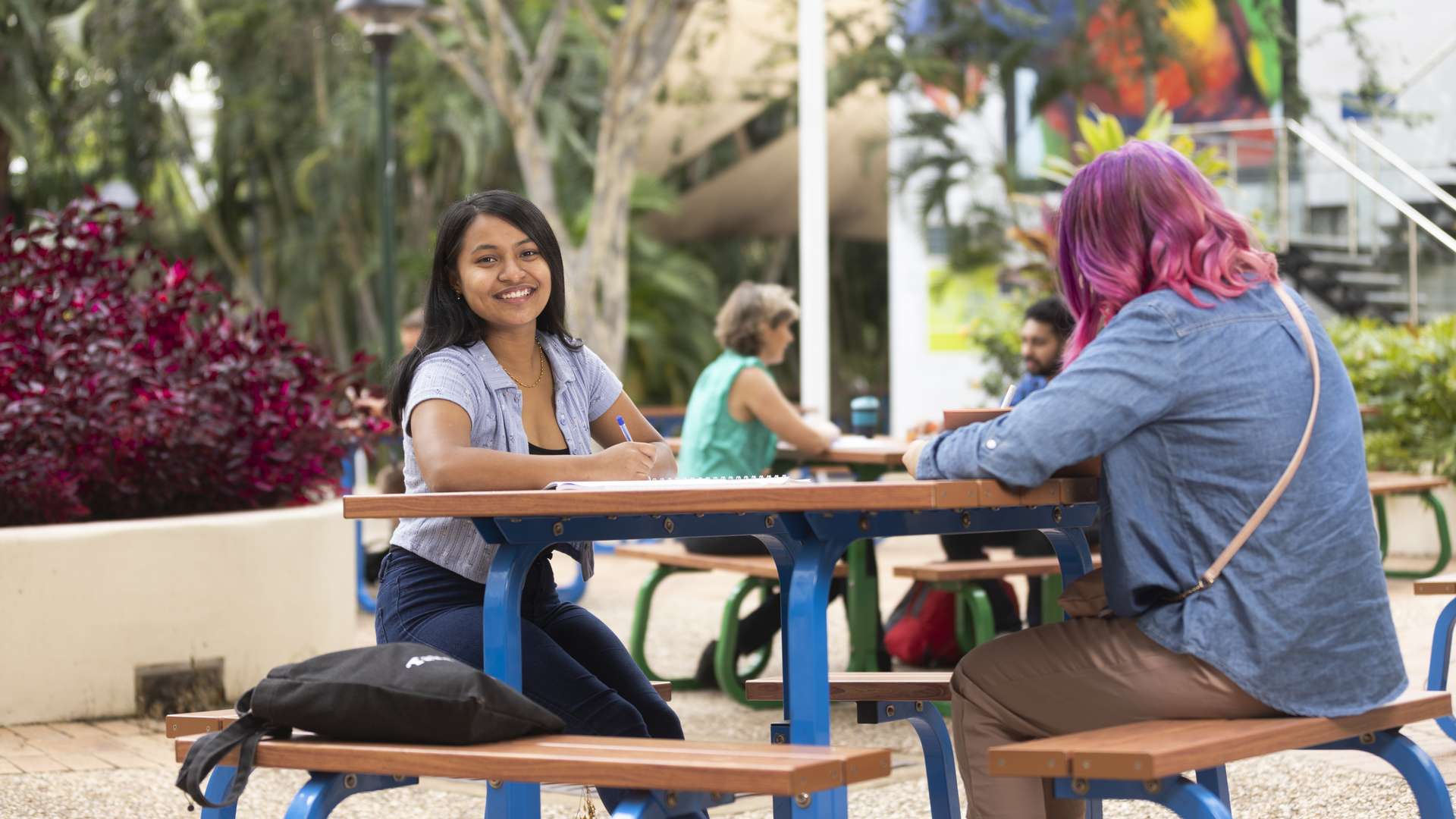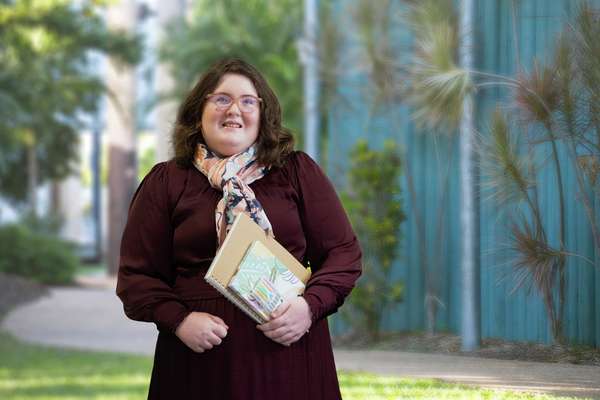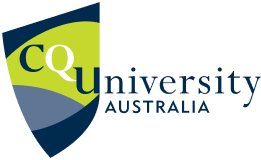| Rank threshold | ATAR: 60 SR: 60 |
| Duration | 3 years full-time, 6 years part-time |
| Location | Online and |
| Next start term | Term 2, 2024 |
| Study mode | On Campus, Online |
| Course code | CA10 |
| First-year fee | $16,320 (Indicative) (CSP) |

Overview
Study the Bachelor of Arts to equip yourself with a multidisciplinary education in a range of humanities and social sciences disciplines. Discover unlimited choices in exploring your passion and interests.
The Bachelor of Arts provides you with a varied and multidisciplinary education and the opportunity to gain knowledge in a range of humanities and social sciences disciplines.
You will experience a variety of perspectives, methodologies, and learning styles, as well as explore disciplines that study how humans recognise, record, and debate human practices, meanings, and values. This will aid you in developing a contemporary understanding of the human condition and how society operates.
By studying CQU's Bachelor of Arts, you'll gain relevant skills and knowledge and have the flexibility to tailor your studies to align with your career goals and personal interests. With a plethora of majors and minors to choose from, you can truly shape your educational journey.
Study experience
- Authentic Learning Experiences
- Industry Relevant
- Seamless Pathways
- Work-Integrated Learning
 “
“I chose the Bachelor of Arts as it was greatly versatile and catered to my love of writing. The best thing was the fact it was so rich in content and stimulated my mind.
Katherine Butler
Bachelor of Arts
Career Opportunities
The skills and knowledge that you gain within the Bachelor of Arts are transferrable across a wide range of industries and professions. You will gain life-long skills in creative thinking, critical reading, critical thinking, effective writing and communication skills, developing clear and cogent arguments, research, data analysis, understanding intercultural relationships, social justice, cultural heritage and environmental planning. These skills are regarded highly by those who recruit university graduates for government departments and various large companies and are beneficial to roles across a range of businesses and industries.
Explore endless career possibilities such as roles within government agencies, administration, publishing houses, environmental planning and management, media, journalism, libraries, museums, galleries, not-for-profit organisations, private companies, teaching, town councils, disability services, community sector organisations, youth workers and universities.
Structure & Availability
Course structure
You are required to complete 24 units, which consist of four core units, two eight-unit majors, and one four-unit minor.
This course has a range of majors available and from Term 1, 2025, you'll have the following majors and minors to choose from:
Majors
- Creative Writing
- Literary Studies
- Geography
- History and Politics
- Liberal Arts
- Strategic Communication
- Theatre Studies
- Visual Arts
- Pathway to Teaching (Early Childhood)
- Pathway to Teaching (Primary)
- Pathway to Teaching (Secondary)
Minors
- First Nations Studies
- Digital Storytelling
- Discovering Theatre
- Essential Geography
- Liberal Arts
- Literature
- Strategic and Social Communication
- Visual Art Practices
- World History
- Writing Stories.
Unit information
For information on the units you could study as part of this course, visit the Handbook and select the "Course Structure" tab.
Credit transfer information
If you have already completed study relevant to the course you have enrolled in, you may be eligible for credit transfer.
On-Campus Availability
| Intake | Locations |
|---|---|
| Term 1, 2024 | Rockhampton |
| Term 2, 2024 | Rockhampton |
| Term 1, 2025 | Rockhampton |
| Term 2, 2025 | Rockhampton |
Online Availability
| Intake | Locations |
|---|---|
| Term 1, 2024 | Available Online |
| Term 2, 2024 | Available Online |
| Term 1, 2025 | Available Online |
| Term 2, 2025 | Available Online |
From Term 1, 2025, you'll have the following majors and minors to choose from.
Majors
Creative Writing
Do you have a passion for writing? Our Creative Writing major allows you to develop the skills and knowledge needed as a writer in the digital age. You will develop a tool kit of writing styles and genres, including traditional fiction, non-fiction, poetry and scriptwriting, and experimental and hybrid genres such as speculative fiction, flash fiction, lyric essays, docufiction, and concrete poetry, among others.
Geography
The Geography major offers a diverse set of units in geography, the environment and related discipline areas such as Geopolitics. You will be exposed to an integrated humanities approach that provides excellent foundational discipline knowledge as well as industry-specific knowledge and skills. You will explore contemporary human geography and environmental issues that will improve approaches to managing the environment. You will develop a unique set of knowledge and skills that are useful in a wide range of careers.
History and Politics
History is both the study of the human past and a method of enquiry that allows us to better understand ourselves and the world around us. It requires the sophisticated use of evidence and argumentation to explain continuity and change over time. The skill sets that you can develop from studying history include the ability to identify, analyse, contextualise and synthesise information, to interpret and evaluate evidence and scholarly sources, usually with the objective of explaining the causes of the complex historical events that shape our own unique experience.
Liberal Arts
The Liberal Arts major is available to gain credit for studies you may have completed in another course. Approval from the Head of Course is required to access this major.
Literary Studies
The Literary Studies major brings together two distinct but complementary disciplinary approaches: literary studies, where literature is read for its own sake and for the values it reveals in stories, poems and plays about our lived and imaginary experiences; and cultural studies, where ideas and concepts derived from a broad study of culture are explored through a variety of texts including film, media, television, advertising and the like.
Pathway to Teaching (Early Childhood); Pathway to Teaching (Primary); Pathway to Teaching (Secondary)
If you're considering becoming a teacher, choose from our Pathway to Teaching majors in Early Childhood, Primary or Secondary Teaching. These majors are designed to fast-track you to our Master of Teaching, where you can apply for four units of credit.
Strategic Communication
Strategic Communication involves using contemporary communication approaches to reach diverse audiences. In this major, you will learn both the necessary practical skills and the theoretical understandings that will enable you to create an impact on individuals and organisations. You will work on real-world scenarios and with real clients, enabling you to develop clear knowledge about how to communicate effectively, devise and implement strategies, and maintain relationships with stakeholders.
Theatre Studies
The Theatre Studies major involves the study of theatre through the ages. Study areas include medieval theatre, commedia dell'arte, Shakespeare and modernism as well as a range of contemporary Australian and international theatre plays and practice. You will learn about traditions and methods while developing your own creative practice and understanding of the power of theatre. The skills sets that you can develop from Theatre Studies include the ability to identify, analyse, contextualise and synthesise the dramatic form within its time-specific context.
Visual Arts
Creating visual art enables self-expression and self-exploration, but it also has an important social function. As crafted acts of public communication, visual artworks help us all to understand ourselves and our relationship with the world. Contemporary visual art practices are often motivated by forms of social engagement. Through studying the visual arts, you will learn to shape creative thinking skills into a unique process to create engaging and relevant artworks for public display. You will also hone your critical thinking skills to analyse how culture impacts us as individuals, whilst developing skills to professionally interact with arts infrastructure.
Minors
Digital Storytelling
This minor introduces you to fundamental skills in visual design, digital video production, and narrative and documentary filmmaking techniques.
Discovering Theatre
Explore the origins of theatre, musical theatre, Australian drama and comedy's evolution within theatre in this minor.
Essential Geography
The heart of geography is earth system exploration at the intersection of place, space and people. With geography, you ponder this new age of the Anthropocene and how population impacts the circulatory systems of the earth that make life possible. The Essential Geography minor provides you with the context for critical thinking wherever employment opportunities take you. You will gain an appreciation of key questions for urban environments, rural landscapes and natural hazards within the architecture of the earth system.
First Nations Studies
In this minor, you will engage with colonialism taking you into the national context of First Nations Australians and perspectives in interface with non-Indigenous power and authority. You will develop skill sets to critically investigate, argue and interpret issues around identity, nationalism and power and to question issues and approaches that purport to be about ‘reconciliation’.
Liberal Arts
The Liberal Arts minor is available to gain credit for studies you may have completed in another course. Approval from the Head of Course is required to access this minor.
Literature
The Literature minor provides you with an opportunity to explore a selection of literature for the ideas explored and the values revealed about our lived and imaginary experiences. You will be introduced to discipline critical debates. You will develop advanced reading skills by writing about what you are reading. You will learn how to analyse texts across a range of genres.
Strategic and Social Communication
Strategic and Social Communication is about using communication techniques with purpose. This minor shows you how to craft a message for a specific audience to ensure the message is received as intended and can be acted upon. Techniques in this minor are drawn from the public relations discipline and combined with fundamental writing skills.
Visual Art Practices
Creating visual art enables self-expression and self-exploration, but it also has an important social function. As crafted acts of public communication, visual artworks help us all to understand ourselves and our relationship with the world. Through studying the Visual Art Practices minor, you will learn a combination of traditional skills and contemporary ways of thinking relevant to the design and manufacture of contemporary visual artworks. In this minor, you will work in a studio, think critically and engage in creative processes to develop a portfolio of your own contemporary artworks.
World History
The World History minor uses the survey history approach to introduce you to some world histories, including ancient, medieval, modern and twentieth-century eras. You will explore the major transformations of our past to gain knowledge of what motivated these changes. You will gain skills in using historical evidence to articulate well-rounded and convincing arguments for key questions. This minor also includes a unit on Australia's environmental history, where you will explore the nexus between the human world and the physical environment and look at changes over time.
Writing Stories
Calling all storytellers, this minor helps you to develop and refine your skills in writing engaging works for different audiences and markets. You will learn to think critically about writing and be able to produce narratives in fiction and non-fiction. The Writing Stories minor also offers you the chance to practice the art of telling compelling tales by experimenting with various forms and genres.
This course has no residential schools.
Professional Practice and Experience - BUSN13004
This work-integrated learning will involve a placement in an organisation loosely related to one of the BA discipline majors. For example, a work placement in a museum.
Public Relations Project - COMM13111
Students who choose the Strategic Communication major will have the opportunity to undertake a work placement of 120 hours in a communication related field.
Requirements
To be eligible
For your application to be considered, you must meet the following entry requirements.
Student and Course Profiles
View the student and course profiles for this course and learn about CQU's Undergraduate Profile for Term 1, 2024 via our Institute Profile.
During your study
While not needed to apply, you'll need to meet the following requirements throughout your studies.
Fees & Scholarships
Indicative First-Year Fee
The Indicative First-Year Fee is the approximate cost of enrolling in this course for one full-time academic year (eight units over two terms) for a Commonwealth Supported Place (CSP). Your actual fees may vary, depending on the units you select to study and your study load. Fees are reviewed each year and are subject to change. Understanding your fees.
Commonwealth Supported Places
This course has Commonwealth Supported Places (CSPs) available, and as a domestic student, you'll be offered a CSP, provided you meet CSP eligibility requirements. CSPs are subsidised by the Australian Government, meaning you are only required to pay the student contribution rather than full tuition fees.
HECS-HELP Loan
You may be eligible for a HECS-HELP government loan if you are offered a CSP. HECS-HELP is an Australian Government loan scheme that assists you in paying your student contributions. Provided you meet the HECS-HELP eligibility criteria, you may use HECS-HELP to defer part or all of your student contribution fees.
Part of your course costs will include Student Services and Amenities Fees (SSAF). SSAF is charged in addition to your student contribution or tuition fees and is used to help enhance your study experience. There may also be other costs as part of your studies, such as textbooks, technology expenses, travel expenses, professional certifications, uniforms, or vaccinations. Explore other study costs.
We believe a quality education can be for everyone – regardless of background, location, or life circumstances. That's why we offer a variety of scholarships and bursaries that can give you a helping hand with a range of expenses and enhance your employability.
How to apply
How to apply
Check what you need to do to apply to study this course.
Your application options
Follow these steps
Extra admission information
Prior to applying, take a look at important application dates and learn about our admission considerations, such as information for domestic students with overseas qualifications, indigenous support, and elite athlete, coach and performer support. You should also check out the adjustment schemes that might be available to you and how to access them. You can also explore our offer information to learn more about what happens after you've submitted an application and how to respond to an offer to study with CQU.
Start your application
When applying through a tertiary admissions centre (TAC) you can use the relevant TAC code below to search for a course or add it to your application preferences.


